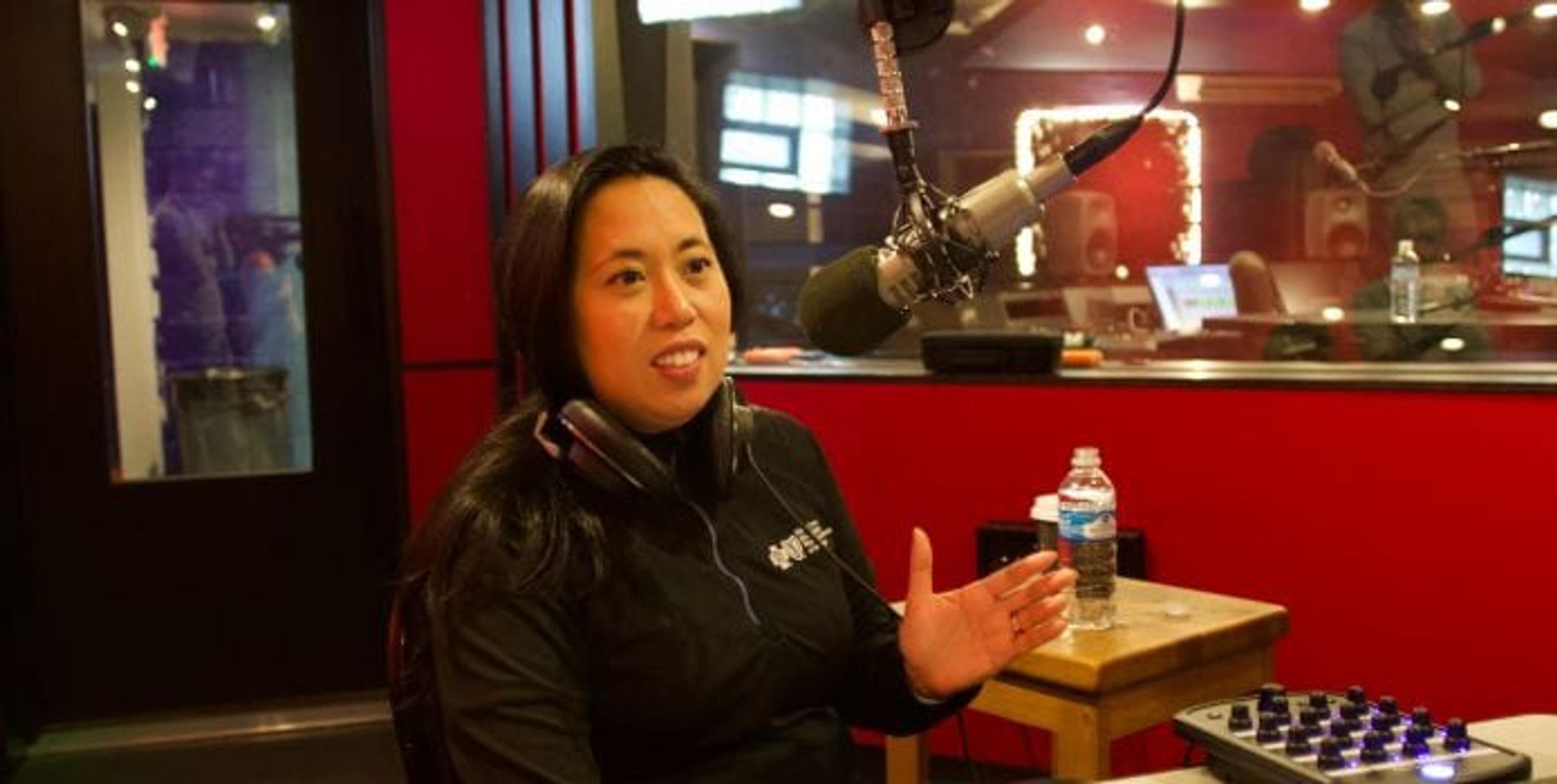National Nutrition Month
| 1 min read

00:00
00:00
About the Show
On this episode, Chuck Gaidica and Grace Derocha discuss National Nutrition Month and the different ways to revamp your diet.
“This is an actually scary fact: The number one eaten vegetable in America is potatoes in French fry form… And kids, only 8 percent of kids are eating leafy greens daily, so they are missing a lot of good vital vitamins and minerals from fruits and vegetables.” – Grace Derocha
In this episode of A Healthier Michigan Podcast, we explore:
- The origin of National Nutrition Month
- The importance of a yearly physical
- The difference in men and women’s dietary needs
- Common nutrient deficiencies in older adults
- How to teach children healthy eating habits
Transcript
Chuck: This is A Healthier Michigan Podcast, Episode 23. Coming up, we discuss National Nutrition Month and how to approach it in 2019.
Chuck: Welcome to A Healthier Michigan Podcast, the podcast dedicated to navigating how we can improve our health and well-being through small healthy habits we can start today. I’m Chuck Gaidica, your host. Every other week, we’re going to sit down with a certified health expert from Blue Cross Blue Shield of Michigan, and dive into topics covering nutrition, fitness, so much more, and who knew? There’s a whole month to celebrate this. Maybe there’s a parade for National Nutrition Month. I didn’t know.
Chuck: On this episode, we are talking about, well, I guess nutrition in general, but how this can relate directly to you and the changes that you could make. You know, it’s not too late. New Year’s resolutions, I’ll bet some have folded over into February, and now March, and we’re okay.
Chuck: Grace Derocha is back with us, registered dietitian, certified diabetes educator, and certified health coach with Blue Cross Blue Shield of Michigan. You are just spectacular. You’re like Superwoman. You’re like a superhero. You’re a mom, you’ve got kids. You’ve got all these things, these degrees. You’ve got all this knowledge, and what I love about you, well, is everything, but what I love is that you make it understandable for all of us to kind of take away things that are important.
Grace: Chuck, you’re my favorite.
Chuck: Oh, you’re so sweet. I’m not just buttering you up. Well, that’s a … That was last episode.
Grace: Yeah.
Chuck: We talked about good fats and bad fats. So let’s talk about this a minute. You knew that there was a National Nutrition Month. How about the rest of us? Honestly, I didn’t know there was a whole month.
Grace: Yes.
Chuck: What should have I been doing?
Grace: We’re going to talk about it. So March is designated National Nutrition Month, and it is put on or kind of the thing of the Academy of Nutrition and Dietetics, so as a dietitian, obviously I’ve known about it.
Chuck: Right.
Grace: And what I think is super interesting is that this year … They used to in the past always have a theme, like in 2018 it was Go Further With Food, there’s other ones that were like Shape Up Your Plates, and they would always name the month with something more than just National Nutrition Month.
Chuck: A little catchy, probably looks good in a picture.
Grace: Right.
Chuck: Yeah.
Grace: Made a cute little logo to go with it.
Chuck: Yeah, yeah.
Grace: But starting this year, and I actually think this is hugely impactful, they are getting rid of the little slogan that goes with it, and just celebrating National Nutrition Month.
Chuck: Okay.
Grace: And the fact that as a dietitian working with someone or as a person thinking about better nutrition, you have to start with where you’re at. You have to be in the know of where you are today so that you can improve upon that.
Chuck: So National Nutrition Month I think, maybe I’m speaking out of turn, it would be good that the spotlight is on it for March, but you’d love to see this just become something that’s top of mind the whole year long, right?
Grace: Yes.
Chuck: Yeah.
Grace: I mean, you know. Chuck knows me and you guys have probably started to know, food can be our medicine. There are so many things that we can do nutritionally that we need to add in. A lot of times people are cutting out, but maybe we need to flip how we think about things to improve the nutrition of our body.
Chuck: I want to come back to this at the end as a takeaway, but I know you’re big on getting a physical, but see, if we’re going to know who we are, if I need to know who I am, don’t we need to establish some kind of baseline?
Grace: Yes.
Chuck: Whether that’s just I journal or I really do sit down and think about well, what is the thing I need to tackle?
Grace: Yes.
Chuck: How do we do that? How do we establish the starting point?
Grace: I would always tell people go and have your yearly physical assessment with your primary care physician, holistic doctor, wherever you might go to really see where you’re at today, and then reflect and be like so honest with yourself. It could get a little ugly, but think about where you are and where you want to be, and some of those steps to get there, and they don’t have to … You don’t have to cut out all bagels for your whole life.
Chuck: Right.
Grace: You can have some once in a while, but thinking about how we can improve upon that.
Chuck: So for me as a guy, I’m not going to go deep on this, but you know that I went through a physical and I had blood work done, and for me as a geek, I love numbers, right?
Grace: Mm-hmm (affirmative).
Chuck: I’ve always loved science and math, so I’m seeing all these numbers of things that changed for the good within a six month change, but for me as a guy, I have to tell you. If I were listening to this five years ago and I hear, “Get a physical,” la, la, la, la, la. Okay, that sounds right, but I don’t have time. Once I got in that habit of trying to discover who I am and then I started to see that I could actually help move the needle toward goodness-
Grace: Yes.
Chuck: It excites me now.
Grace: Yes.
Chuck: So now I’ve got the app and I’m doing great stuff, you know, so I really commend you for telling us because … Maybe it’s the same for women, you know better than me, but I know a lot of guys just tune out of that whole idea. “Physical? Oh, I’ve got a meeting. I can’t do it.”
Grace: I think … no offense, honey, Tom, if you’re listening, but men are not as good about making that appointment.
Chuck: Okay.
Grace: But I have a variety of patients that aren’t. Part of it is because they don’t want to know.
Chuck: Yeah.
Grace: Because when you know, then you know you have to actually do something, or it could be a little bit scary.
Chuck: So I’m not scared anymore, but there are still things that I can do better, so tell me about good nutrition and health goals, and where do I want to be? What are some of the things I should be shooting for?
Grace: So as a man, so I will tell you, some of the common things that men are missing in their diet are usually a variety of minerals, magnesium, potassium. Fiber is a big one.
Chuck: Okay, yeah.
Grace: Heart-healthy fats, so those are like the main four things. When I say minerals, I guess there’s kind of a variety, magnesium, potassium, calcium.
Chuck: Is that just as simple as grabbing a banana and eating spinach every once in a while?
Grace: It can be.
Chuck: It can be.
Grace: It can be.
Chuck: Huh.
Grace: So making that effort to having some fiber-rich foods, like your oatmeal. We’ve talked about-
Chuck: I eat Kashi, the original Kashi-
Grace: Uh-huh.
Chuck: So I’m getting protein and fiber, I know.
Grace: Yes.
Chuck: I happen to like it. Not everybody likes it.
Grace: And those are whole grain. Kashi uses whole grains to make its products.
Chuck: Yeah, yeah.
Grace: So those whole grains, those fiber, any kind of produce, any kind of fruits and vegetables are going to help with those minerals, and then making sure that you are just doing a little bit better in that fruit and vegetable department, that’s a big one.
Chuck: And you said in the last episode for especially all of us in Michigan where the sun doesn’t come out for a while, vitamin D is an important supplement-
Grace: Yes.
Chuck: Plus we should be getting it naturally.
Grace: Yes.
Chuck: Yeah.
Grace: So there are some vitamin D-rich foods. There’s mushrooms. Some of our dairy has vitamin D added into it, but we have to make sure that we’re also getting some sun time.
Chuck: Yeah, yeah, and even in the winter, so letting my dog take me for a walk, bundle up, and still go.
Grace: Yeah.
Chuck: It’s still a good time.
Grace: Try to expose some of your skin whenever you can.
Chuck: What other nutrients are we lacking, and I guess you may be able to break this down into kids and elderly-
Grace: Yeah.
Chuck: And men, women, but what are the things we should pay attention?
Grace: So we kind of went with the men, so we know that now with women, often iron is missing, some heart-healthy fat. We know that heart disease is the number one killer of women, so making sure we get our heart-healthy fats in there. A little bit of iodine, vitamin D, which we keep talking about, folate. So, some of those sources. Let me think. Iodine-
Chuck: Why are we missing iodine? Iodized salt.
Grace: I know.
Chuck: How can we be missing iodine?
Grace: Well, because women are a little bit better about watching their salt intake.
Chuck: Oh, so we’re cutting back on that, and then in turn getting a bonus of a problem maybe.
Grace: Yeah, so to be careful, and I want to bring up sodium because we kind of touched on it last episode with heart health, so for general good health, 2,300 milligrams of sodium a day is kind of where we should lie for most people. Some people need more because they have low blood pressure. Most people don’t, but watching that. Don’t get mad at me. One teaspoon has 2,300 milligrams of sodium already, one teaspoon of salt.
Chuck: So you know I’m tracking on an app. I mean, I’ve been naming names, so I don’t know, but I use the Lose It! app.
Grace: Yes.
Chuck: It’s free.
Grace: Yeah.
Chuck: Right? I’m trying to be 1,500 milligrams or less, but let me tell you what I’m finding. It’s not me shaking salt on my couple of scrambled eggs in the morning. It’s all the hidden stuff that’s baked into the cake. You look at the side of a can of turkey chili. You think you’re doing something right. Holy moly. It’s off the charts.
Grace: Yes. It really is. It’s probably over your amount already for the day.
Chuck: For the day, right.
Grace: Yes.
Chuck: Yeah.
Grace: Definitely anything processed is going to have more, anything canned, because they add the salt in for flavor, but also to kind of preserve what that food is.
Chuck: Yeah.
Grace: So reading those food labels and reading them accurately, making sure you look at the serving size to be aware of what that sodium level is…
Chuck: And do you know how I know this so much? I’m not just the geeky guy who walks down the aisles, because that drives me nuts. On my app, I’ve got a scanner. I just scan the barcode. It tells me right away.
Grace: Yes, I love that.
Chuck: And when I see it, I think, “Uh-oh, not for me.”
Grace: Right.
Chuck: So it’s a good way to … At least I can spank my own hand that way.
Grace: Yeah, or find one that has less sodium or make some yourself.
Chuck: Yeah.
Grace: There’s options.
Chuck: And what about supplements, because you hear stories or you read articles about vitamins are good, vitamins are a waste of time. Should we be considering supplements? I know if you have a specific need, that’s one thing.
Grace: So I have to give you my dietitian spiel.
Chuck: Okay, it is the month. It’s your month.
Grace: Yeah, it’s my month.
Chuck: Yeah.
Grace: Supplements are called supplements because they’re supposed to supplement the diet.
Chuck: Okay.
Grace: So ideally you’re trying to do you best through your diet. I see no harm or foul in getting some supplementation, like a multivitamin. No one eats perfectly every day.
Chuck: Yeah, yeah.
Grace: Things that you know you might be lacking in, like when you go see your doctor and they tell you your vitamin D is low or something-
Chuck: Or your B whatever is low, you can do that, and it’s cheap, it’s cheap stuff.
Grace: Yeah, and I would tell people though, make sure you’re going with a good company, and there are different certifications if you will of different vitamins that will tell you that they’re cleaner and are actually what they say they are.
Chuck: So for those of us who are stepping toward elderly and for us that have parents that are certainly there, you’re big on making sure we’re helping manage our own protein content, but theirs as well-
Grace: Yes.
Chuck: Because sometimes that falls off the chart.
Grace: Yeah, so we were talking about that earlier, being a sandwich generation taking care of our kids or grandkids, and then looking at our parents and wanting to help them as well.
Chuck: Right.
Grace: For seniors, one of the things that they’re really missing is protein and water.
Chuck: Yeah.
Grace: They’re often dehydrated, and I know this because I’ve heard this from my grandparents back in the day, and my mom even now tells me, “I don’t want to drink that much water because then I have to get up to go use the bathroom,” and then it’s this vicious cycle of not wanting to have to do that, especially late at night when they want to sleep. So I always tell her, “Try to get it in before you’re going to go to sleep so that you don’t have to get up in the middle of the night.”
Chuck: You know the other one I hear is, “I forgot to drink water.”
Grace: Mm-hmm (affirmative).
Chuck: Now, to me, that is so counter intuitive, right? I mean, how do you forget, but you’ve caught yourself on days.
Grace: Right.
Chuck: You’re running and gunning, right, flying all over the state, but I think what I have found and when I try to listen, I try to listen to even my own parents, I will say, “Well, what is the way you drink water better?” My dad has actually said, “I drink more water when it’s actually in bottles than me having to get up and go to the sink and fill a cup.” Okay.
Grace: Yes.
Chuck: That’s his thing, so guess what? There are bottles of water everywhere.
Grace: Yeah.
Chuck: And we leave them out or we have more in the fridge, so I think when you say getting in touch with you, that’s a way we can help get in touch with those who may need our help somehow.
Grace: Absolutely.
Chuck: Yeah.
Grace: And I think that is such a great point too that your dad brings up. I had a patient, I love her. She hated water, hated it.
Chuck: It doesn’t sound right, does it?
Grace: Right. She never drank it.
Chuck: Yeah, yeah.
Grace: And she was not in the best health-
Chuck: And coffee and iced tea doesn’t really do it because then you’ve got caffeine and all the rest.
Grace: Right. She was drinking coffee or pop or juice or different things, and I was like, “All right, pump the brakes. Let’s figure out what we can do.” We started doing fruit infusions in her water.
Chuck: Yeah.
Grace: She loves fruit. Instead of drinking juice, we got rid of that. We lowered her blood sugar by doing that, and then we also got her hydrated.
Chuck: I think we’re doing better in the West now when we’ve got sparkling waters and the La Croix.
Grace: Yeah.
Chuck: I mean, we have choices, right?
Grace: Absolutely.
Chuck: That’s not just overabundance of sugars and other things.
Grace: And I would tell people, so 80% of our hydration comes from water, what we drink, but 20% comes from our food, so if you’re having lots of fruits and vegetables, or especially right now when it’s a little bit chilly still, having soup or things of that nature-
Chuck: Right, right.
Grace: Can help get that hydration status up.
Chuck: What about focus on our kids?
Grace: Oh my…
Chuck: Is there a place where there’s, you’re seeing more deficiencies that we should pay more attention to?
Grace: Yes, so this is an actually scary fact. The number one eaten vegetable in America is potatoes in French fry form.
Chuck: Okay.
Grace: And kids, only 8% of kids are eating leafy greens daily, so they are missing a lot of good vital vitamins and minerals from fruits and vegetables.
Chuck: Yeah.
Grace: Think about when your kids were young. I know my daughter’s real good. Tommy, my son, is not that good at eating his fruits and vegetables, so that would be a big one, and then, this makes sense, they’re also not getting enough fiber then.
Chuck: Yeah, yeah.
Grace: So then they get a little backed up, and then there are stomach issues and GI issues and they’re uncomfortable, but they can’t fully explain it because they’re younger, so try your best. Make it fun for them. Get them involved in that process of enjoying fruits and vegetables and the colors.
Chuck: I eagerly look forward to the farmer’s market, which you know is always hope that there will be warmer weather in Michigan, right?
Grace: Yes.
Chuck: But that’s the time where we can look for some of the other things that add the texture and color to salads, because I think back to even my grandfather. He ate stuff in salads that even to this day, I’m not in the habit of putting in radishes or mushrooms, but his salads were always spectacularly colorful and textural and different stuff that seemed weird to me as a little kid.
Grace: Yes.
Chuck: I would think, “Radishes, oh Grandpa,” and now I look at it and I think I need to, even if I have to force myself, it’s a good idea because just iceberg lettuce, I don’t know.
Grace: Yeah.
Chuck: Yeah.
Grace: Well, I was going to say also I love farmer’s markets, and it’s a fun place to take the kids.
Chuck: It is.
Grace: To take your parents, to take the whole family, and pick out different things and try different things, or I was going to say about salads, this is my cheat trick that I try to do. Whenever I go out to eat with my mom, she’s like, “No one ever makes salads as good as a restaurant,” and there is something about, they do.
Chuck: Yeah.
Grace: It’s colorful, it’s beautiful.
Chuck: And their dressings are perfected too, let’s face it, yeah.
Grace: They make these homemade vinaigrettes that are just divine.
Chuck: Right.
Grace: But you can do that at home, so I always try to pick a favorite salad that I might try at a restaurant and try to mimic it, and it turns out pretty good.
Chuck: Good for you. Good for you. When do you want us over?
Grace: You guys are all welcome to come over and have salad with me.
Chuck: Okay. All right. So we talked about getting the annual physical, and guys, listen up. Just do it. Just lean into this because, you know, it’s something we need to do and March is still not a bad month to consider it. It didn’t have to happen in January. You’ve said this before, unpack this a little bit. Use food as medicine.
Grace: Yes.
Chuck: What do you mean?
Grace: Think about this. The food that we eat has everything that we need.
Chuck: Mm-hmm (affirmative).
Grace: Right? It has vitamins. It has minerals. It has fiber. It has antioxidants that fight free radicals to fight chronic conditions like cancer, to give you younger looking skin. Free radicals are also our wrinkles and our graying hair and things that we don’t want on our skin. Those are like some of our what I call glow foods.
Chuck: Yeah.
Grace: They help you glow.
Chuck: And what are those? I mean, give me some, because I want to glow.
Grace: Blueberries, kiwi.
Chuck: Oh, I eat those all the time.
Grace: Yeah. Any kind of greens, mustard greens, collard greens, kale.
Chuck: Yeah, okay.
Grace: All of those. Yum, yum. I’m hungry.
Chuck: I see. Your wrinkles are going away right now, the few that you have, and a blood pressure check. This is critical.
Grace: Yes.
Chuck: And I know in my own family, we’ve had to deal with this because of a family member who really has issues, but we got one of those portable contraptions in the house.
Grace: Oh yeah.
Chuck: It’s a good line of defense so that you don’t have to wait until you think you’re going to go to the doctor and that gets canceled.
Grace: Yes.
Chuck: Yeah.
Grace: So staying hydrated, keep your blood pressure in check, watching that sodium, reading those labels, trying to avoid the excess of the salt shaker, and really thinking about what you might be lacking in now, being really honest with yourself like I said earlier.
Chuck: Yeah.
Grace: Because we all know. We all have like, “I put too much creamer in my coffee.”
Chuck: Well, if you eat a burger out every day, I mean a big one, and you check out the sodium content, even on their own nutrition website page for the burger place, it will astound you. Now, if you’re doing it once in a while and you’re drinking water, it probably doesn’t matter, just … goes away.
Grace: Yeah.
Chuck: But I’ve looked at that on behalf of this person in my family’s life. It can be crazy how much sodium is locked up in there.
Grace: Yes.
Chuck: Yeah.
Grace: We both were talking about that earlier, yeah.
Chuck: All right.
Grace: So pay attention and do better. Try a little bit to do better.
Chuck: When you see me next time, I’m going to look 20 years younger. I’m just saying. I’m going to … It’s going to go backwards.
Grace: Everyone already knows how amazing you look.
Chuck: Good to see you.
Grace: He does.
Chuck: Good to see you.
Grace: Thanks, Chuck.
Chuck: Always good to have Grace Derocha here. Listen, we want you to be here every single time we’ve got a new episode. A Healthier Michigan Podcast brought you by Blue Cross Blue Shield of Michigan. If you like the show and you want to know more, check out the website. Here it comes, Ahealthiermichigan.org/podcast. You can leave a review or a rating on iTunes or Stitcher. Catch us on Apple Podcasts, Spotify. Use the favorite app you want, and you can get new episodes on your smart phone or your tablet. We’re coming to you new every other week, and don’t forget our newsletter right there online. I’m Chuck Gaidica. Take good care.





